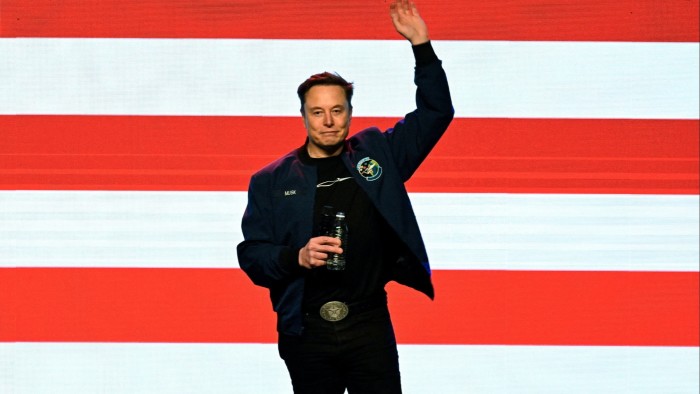Unlock the Editor’s Digest for free
Roula Khalaf, Editor of the FT, selects her favourite stories in this weekly newsletter.
Elon Musk is, among other things, the king of the related party transaction. Almost a decade ago, Tesla bought SolarCity, a clean energy start-up backed by Musk and his brother. Now, the tech billionaire is merging xAI and X, formerly known as Twitter, in an all-stock deal. This values the former’s equity at $80bn and the latter’s at $33bn, for a combined total of $113bn.
From an industrial standpoint, crunching these companies together is probably sensible. One may be a mature social network and the other a rocket-ship artificial intelligence start-up. Yet xAI’s Grok chatbot feeds off the social media’s data, and Grok is tirelessly flogged to X users.
The huge valuations ascribed to the two companies may have raised eyebrows. But both groups are privately held and tightly controlled. The numbers, in this case, are less informative than those of public companies derived by daily trading with liquidity.
And, of course, in all-stock combinations it is the ratio between the two companies’ sizes — rather than their absolute values — that is most intriguing. It determines how big a slice of the combined pie each set of shareholders is going to end up with. In this case, xAI’s are getting about 70 per cent, while those in X are getting the remaining 30 per cent.
Whether this is equitable is hard to determine. xAI has very little revenue, but apparently lots of promise. It was valued at $45bn a few months ago in the private market, which makes its current $80bn valuation look particularly juicy. It benefits from the excitement the technology is currently generating.
Meanwhile, animal spirits at X are frenetic. Banks have recently sold its debt at about face value. That’s a dramatic turnaround compared with the distressed levels it was trading at in late 2024. Musk has also raised fresh equity at roughly the valuation that X is getting in this deal. Annual Ebitda, apparently with heavy adjustments, is just $1.2bn — about the same as interest payments — implying an enterprise value of more than 35 times ebitda. That is a lot for a company relying on sluggish ad revenue.

The two companies have many common shareholders, starting with Musk but including some venture capital investors. Indeed, Musk has given investors who backed his acquisition of Twitter a quarter of xAI’s shares. Should the exchange ratio turn out to be lopsided, at least they will have been on both sides of the deal.
Investors in only one of the two companies will be looking at relative ownerships more closely to weigh the value creation or destruction. With both xAI and X suffering from serious grade inflation, the way the pie has been sliced may, by happenstance, just may make sense, even if the absolute pegged sizes do not. And, anyway, Musk controls both companies and almost certainly gets the final say.
sujeet.indap@ft.com
